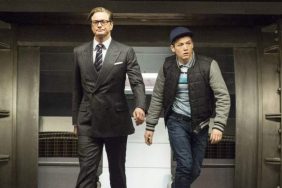Top 10 lists are nice and all, but they’re wishy-washy and noncommittal. CraveOnline is dedicated to answers, damn it, so every week on The Best Movie Ever we challenge our four film critics – William “Bibbs” Bibbiani, Witney Seibold, Fred Topel and Brian Formo – to come up with their one and only pick for the best movie ever made in a certain genre, starring a certain actor, or directed by a certain filmmaker.
This week, Jack Ryan: Shadow Recruit got us thinking… What is the best American spy movie ever? Because the British kind of have a monopoly on the genre thanks to a certain man named Bond. And for the first time, two of our critics picked the same film. Three of them even picked films by the same director. It’s not quite a definitive answer to the question, but it’s closer than we’ve come so far in this series.
In any case, our critics tuned their super secret spy watches and transmitted their picks, and this week they’re joined by special guest Silas Lesnick, the Associate Editor of CraveOnline‘s own sister sites Coming Soon and Superhero Hype. He approached the idea of a “spy movie” a little differently than the rest of them. Let’s take a look.
William Bibbiani:

In my mind, a good spy movie actually involves spying: the act of sneaking around, discovering people’s secrets, and trying not to get caught in the process. Walking into a casino, giving out your real name and announcing that you’re here to foil the bad guy’s plans is actually pretty shitty spying – James… – although it does make for entertaining machismo when done right. There are actually a lot of great movies about serious spying (Tinker Tailor Soldier Spy, Breach, and The Tailor of Panama come to mind) but few films – certainly few American films – ever got under the skin of espionage as powerfully as Alfred Hitchcock’s Notorious.
Although directed by a British filmmaker, Notorious feels pretty darned American, focusing on the transition of youthful irresponsibility to making hard sacrifices for the greater good of the state, and a female protagonist named Alicia Huberman (Ingrid Bergman, always amazing) whose sensuality earns her the heart, or at least the loins, of two spies – a U.S. government agent played by Cary Grant, and a Nazi sympathizer stirring up trouble in Brazil post-World War II played by Claude Rains – after she’s recruited to marry the Nazi and uncover his conspiracy. The conspiracy itself is the definition of a MacGuffin. Instead, the juicy meat of Notorious is the suspense that builds up: will Alicia be caught, will her marriage to the villain ruin any chance of happiness with the man she really loves, and once her husband the Nazi catches wind of her deception, will she be able to escape his funhouse mirror version of domestic bliss before he succeeds in slowly killing her?
Notorious is a whirlwind of conservative façades and barely containable lust, of sacrifice and duty, of love and tragedy, and of the real human drama that stems from acts of subterfuge both political and domestic. It is the best American spy movie ever. It may be the best spy movie ever from any land.
Brian Formo:

The spy genre certainly made its bucks off of the cold war and the global threat of Communism, but look just prior to that lengthy era to find the absolute best film of spying for America’s benefit: Alfred Hitchcock’s Notorious.
The threat in this 1946 film is a group of Nazis who’ve taken refuge in Brazil. But what Hitchcock masterfully does is explore the area where he can bend – but not break – the rules of the great protector of American purity: the Production Code.
Much like the marvelous camerawork in Notorious (gliding above a party at mansion to show the layout, before zooming in on a key in Ingrid Bergman’s hand; stairs, in a crucial moment of suspense, continue downward far beyond their already established height!), Hitchcock skirts around that intrusive censoring device known as the Production Code by having his lovers kiss repeatedly in small blushing bursts to outlast the “three seconds only” rule. Cary Grant and Bergman get some breathy lines in between each lip lock, echoed in the crane of her neck, for nearly three minutes, or almost sixty times the amount of time that kissing was allowed in those pre-Commie-threat times!
Additionally, Hitchcock and his screenwriter, Ben Hecht, have fun toying, but not outright saying that Bergman’s reputation precedes her: she’s the spy who’s shagged a few. Like many a woman in a Hitchcock film, Bergman’s been molded by male desire. But unlike other Hitchcock films, the desired woman is the center of this story. For the sake of country she’s pushed into another’s bed and, perhaps, ends up sympathizing with a Nazi-sympathizer (Claude Rains).
Silas Lesnick:

When considering cinematic spies, one’s mind has the tendency to jump to James Bond as the ideal icon of the genre. Although we’re limiting these selections to American spy movies, I’d argue that, when it comes to actual movie spying, no other film — American or otherwise — gets it quite as perfect as Alfred Hitchcock’s Rear Window.
Jimmy Stewart’s L.B. Jefferies is the everyman spy with a career built not of espionage, but of photojournalism. By setting his lead as a professional truth-seeker, Hitchcock asks the audience to side with Jefferies’ inquisitive study of his neighbors while, at the same time, raising some serious questions about the morality surrounding those same glimpses. After all, how many of us might appear as sinister as Raymond Burr’s Thorwald if unsuspectingly glimpsed at the wrong moment by a stranger?
In point of fact, there’s very little that Bond has going for him that Jefferies does not. In Grace Kelly’s Lisa Fremont he’s got a girl dedicated enough to commit felonies on his behalf and, with his lenses and flash bulbs, he’s got exactly the gadgets he needs to complete his mission. Most importantly, though, we’re there with him every step of the way thanks to a protagonist that, like the audience, is trapped in his chair for the film’s running time. Experiencing each and every clue just as Jefferies does, we become the spies and, even after we’ve caught our breath and the credits roll, we leave the theater with a sudden drive for vigilance, the mundane now mysterious, suddenly aware of all the shadows.
Witney Seibold:

When we say the phrase “spy movies,” we tend to think only of James Bond, and all the trappings therein. We think of the globe-trotting, the sex, the drinking, the suits, the sex, the deranged billionaires with plans for world destruction/domination, the gadgets, the sex. James Bond, a relic of the Cold War and of the Jet Set, has laid such a strong cultural claim on the genre, that it’s hard to think of any spy films, American or otherwise, that can be called anything beyond a pale imitation. American spy films, then, tend to skew a bit more toward shop talk and geopolitics, i.e. Tom Clancy and Robert Ludlum. There is something steely and mechanical about American spy movies in my mind. It’s about how shameful and morally compromising the position is, not about how much sex you can get in Barbados.
And if we’re going to take a literal interpretation to the American spy genre, and choose a film that is exclusively about spying on people, then I can think of no higher representation of the form than Francis Ford Coppola’s 1974 classic The Conversation. Gene Hackman, in one of his best performances, plays a professional eavesdropper who spies on people and records their conversations for a living. He doesn’t carry a gun, and he’s not a sexy seducer. He’s just a cold-hearted working stiff, devoid of charm or apology. This is a film that is about what kind of personality would be required to actually do emotionally detached spy work, but also about how conscience can sometimes get in the way. Often at the least convenient times. It’s the one spy movie I can think of that’s about a man of inaction. And, in many ways, that’s far more interesting and sophisticated than, say, blowing up a submarine.
Fred Topel:

It doesn’t matter that this whole story is probably bullshit. In fact, if it’s bullshit that even makes it more interesting. The story of Chuck Barris’s memoirs about his time in the CIA, which the CIA wholeheartedly denies, makes for a stylish, engrossing espionage thriller and character study. Barris created and hosted “The Dating Game,” “The Newlywed Game” and “The Gong show.” He also claims that the CIA recruited him so that he could use the trips contestants won as prizes on the game shows for their spy missions. Either he’s making it up and that’s batshit crazy, or it’s true and that’s batshit crazy.
Confessions of a Dangerous Mind plays as a spy movie, a celebrity ego movie, and a period piece without relying on any distinction of truth or fiction. Ultimately the veracity of the story is irrelevant. George Clooney’s directorial debut is full of deft cinematography and editing that he clearly learned from the best. Barris either got caught up in the spy game or his own delusions, but either way this is a complex web of suspense and intrigue, comparably or possibly superior to classics like Three Days of the Condor.








